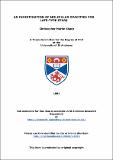An investigation of molecular opacities for late-type stars
Abstract
This work investigates molecular opacities under conditions appropriate to the atmospheres of late-type stars. Given a specified initial abundance of the chemical elements, the equations of atomic ionization and molecular dissociation are solved by iteration for various temperatures and densities. With the abundances of the atomic and molecular species so determined at a particular temperature and density, the continuous absorption coefficient due to a number of processes is first computed, then the molecular band absorption coefficient is computed line-by-line superimposed for diatomic and triatomic molecules considered separately. The band calculations for the diatomic molecules include all possible isotopic variants, but
computing resources did not permit this degree of detail for triatomic molecules, nor diatomic and triatomic molecules to be considered together. These calculations are performed for a number of different temperatures and densities.
The theory for calculating the spectral lines due to molecules is discussed in some detail, with various methods being investigated for computing opacities including the contributions from these spectral lines. With the computing resources available, the best method for the calculation of the opacity due to the molecular absorption is
found to be that of opacity sampling, sampling is adequate, provided the frequency of sampling is adequate.
From the results presented in this thesis, a number of important conclusions can be drawn. At low temperatures and high densities, pressure-induced absorption due to molecular hydrogen is an important source of continuous opacity. Isotopic variants of at least diatomic molecules pave to be considered in any calculations, as they can
significantly affect the contribution that diatomic molecules make to the Rosseland mean opacities. Also at low temperatures, water is a major source of absorption. Finally, tables of some thermodynamic quantities for the molecular gas are given for a number of temperatures and densities.
Type
Thesis, PhD Doctor of Philosophy
Collections
Items in the St Andrews Research Repository are protected by copyright, with all rights reserved, unless otherwise indicated.

